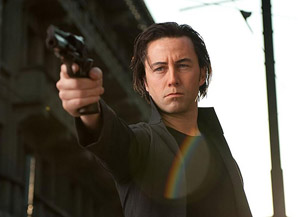Movie Review: Looper
By Matthew Huntley
October 1, 2012
BoxOfficeProphets.com

The story takes place in 2044, in Kansas of all places. Thirty years from then, time travel will be invented and immediately outlawed, but that doesn’t stop future crime bosses from using it to dispose of their enemies. That’s where loopers come in; they’re the hired guns who carry out the kill and get rid of the body after it traverses time space. Each looper has a designated spot where their assignment will appear and they instantly shoot them with a specialized weapon called a blunderbuss. When the job is complete, the crime organization pays the looper in silver bullion.
All this is relayed to us by Joe (Joseph Gordon-Levitt), a young man but seasoned looper whose career choice has afforded him a privileged lifestyle in an otherwise bleak and dystopian world, which is ridden with crime, poverty and a genetic mutation that has given some of the population telekinetic powers, though their talents are mostly limited to parlor tricks like the ability to levitate quarters. Joe hoards most of his earnings but still manages a life full of expensive cars, nightclubs, showgirls, and a nasty drug habit that leaves him high and free, which is probably his way of dealing with his day job. For Joe, this is all just temporary until he saves enough money to move to France.
Joe tells us that a looper’s contract eventually ends, and to cut off any and all ties to their assassins-for-hire, crime bosses send the loopers’ older versions back through time to be killed by their younger counterparts. This is all part of the deal and something you accept from the get go, but Joe’s friend and fellow looper, Seth (Paul Dano), can’t bring himself to do it when his older version’s turn comes up. He lets his future self escape and runs to Joe for help. In one of the film’s many scenes where dialogue plays a key role, Joe engages in a one-on-one conversation with his boss, Abe (Jeff Daniels), who was sent back in time to manage the loopers. He gives the kid two choices: give up his friend or surrender half his silver bullion stash.
Abe has some well written dialogue and Daniels, one of our most natural-sounding actors, delivers it without making it seem like it was written. When he tells Joe about the potential consequences of a young and old looper running around, he casually brushes over all those “racking our brains” concepts that arise when we think too hard about the paradoxes of time travel (he must know how common a device time travel is in the movies and therefore feels no need to dwell on the conventions). He also puts a twist on the traditional crime boss by calling out the clichés associated with the archetype. “You probably think we’re going to break your hand with a hammer.”
Joe makes his choice and moves on, but he soon finds his next kill is his older self (Bruce Willis), who also manages to escape. When the two Joes meet up at a remote diner (there’s a nifty way Young Joe sends a message to Old Joe), the older one explains the future’s crime circuit has been taken over by a man known only as the Rainmaker, who intends to close all loops. During Old Joe’s seizure, the Rainmaker’s henchmen murder his wife (Summer Qing) and he’s now on a mission to prevent that from happening.
Where the film goes from here, I cannot say without giving away crucial details, but two more important characters are introduced, a young woman named Sara (Emily Blunt) and a little boy she’s raising named Cid (Pierce Gagnon). They live on a sugar cane farm and become of increasing interest to both Young and Old Joe, whose differing motivations force them to turn on each other.
I mentioned Looper has the complexity and depth of a classic noir. This shouldn’t come as a surprise to fans of its writer-director, Rian Johnson, who made the fantastic Brick, which reinvigorated the noir genre with a murder-mystery set in a high school. Now, with a bigger budget, Johnson combines noir with science fiction but avoids one of latter’s common pitfalls by assuming the audience cares more about action and presentation than character and story. If anything, Johnson’s approach is the opposite. He exhibits patience and allows scenes to play out fully. Nothing feels rushed and the drama and emotion build to a point where they take precedence over the still-effective chase scenes, violence and special effects.
Johnson also sidesteps narrative overkill. For instance, there’s a scene where a pertinent character is eliminated but he doesn’t bother showing us the obvious because he knows we’re smart enough to put the pieces together ourselves. That’s a mark of not only a lean, economic storyteller but one who trusts his audience.
Some critics have called Looper “groundbreaking” and have written “there’s nothing like it.” I wouldn’t go that far, because the movie is a lot like others of its kind, especially in regards to its time travel premise. It does stand out, however, for the way it balances all of its qualities and becomes, simply, an engaging story, one that’s intelligent and surprisingly heartfelt. It has relentless momentum and is always moving forward, right up until the end, when it fades out on just the right note, leaving us touched and thinking about our own purpose and mortality. That doesn’t make Looper a groundbreaker, especially for a science fiction movie, but it is a rarity, and a welcome one at that.